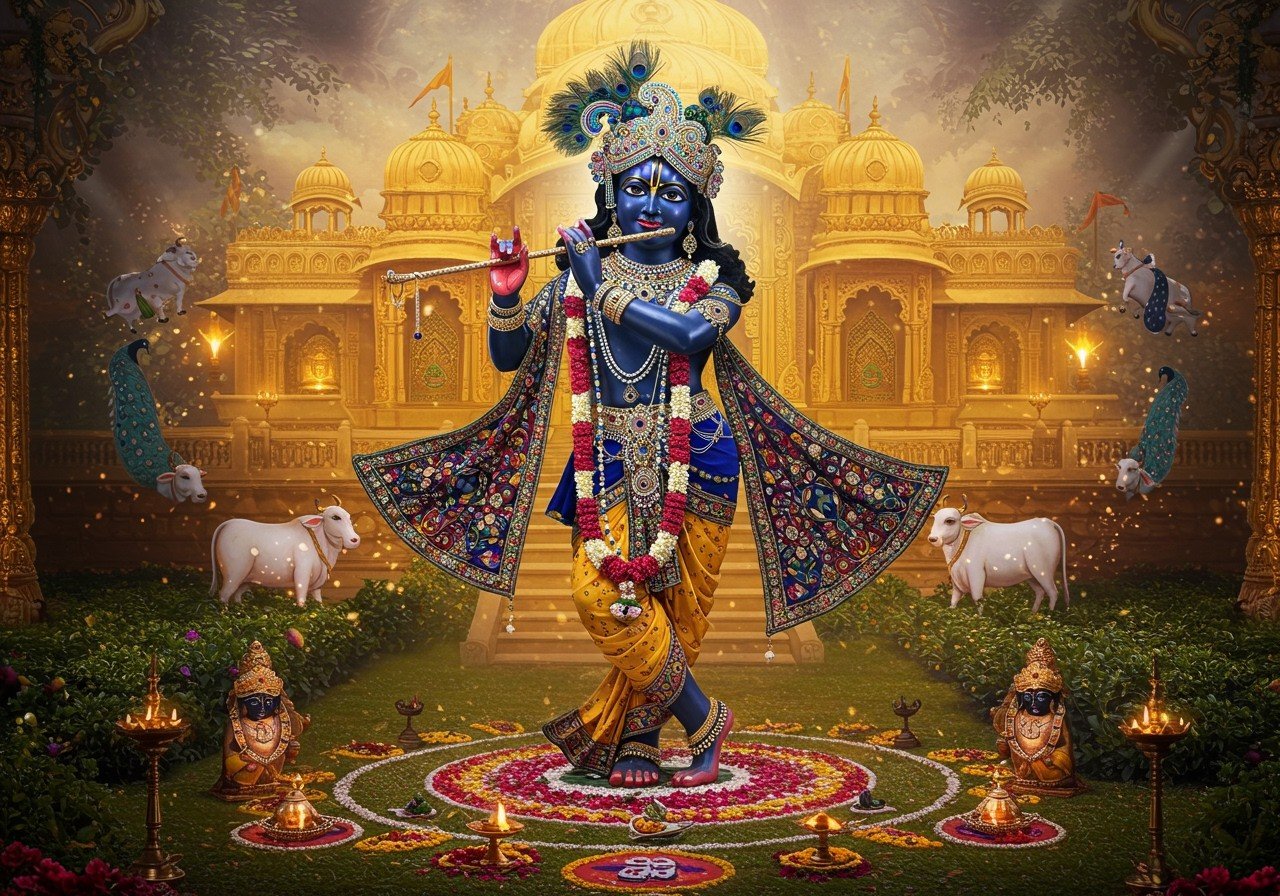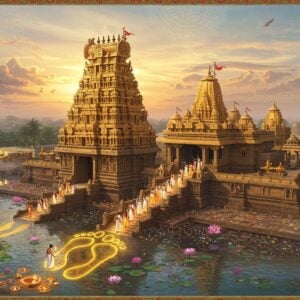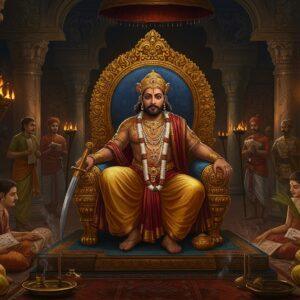
In the rich tapestry of Hindu mythology, Vallabha holds a special place, particularly for followers of the Pushtimarg sect. This symbolism is deeply woven into Hindu spiritual practices, offering a unique perspective on devotion and divine love. Understanding terms like ‘Vallabha’ and ‘Pushtimarg’ is crucial to appreciating this profound tradition.
Understanding Vallabha: Meaning and Significance
The word Vallabha translates to ‘beloved’ or ‘dear one.’ It’s often associated with Lord Krishna, emphasizing the importance of divine love and personal devotion in Hinduism. Within the Pushtimarg sect, Vallabha takes on a significant role. This path, established by Vallabhacharya, focuses on grace and a direct connection with Krishna. Here’s what you need to know:
-
Vallabha and Krishna: This connection highlights the beauty of personal devotion, where the devotee sees Krishna as a beloved friend and guide.
-
Pushtimarg Sect: Founded by Vallabhacharya, this path underscores the importance of Krishna’s grace in attaining spiritual fulfillment.
Understanding these links helps us appreciate how Vallabha represents a deep, personal bond with the divine.
Krishna Vallabha: The Divine Beloved
At the heart of the vibrant Pushtimarg tradition lies Krishna Vallabha. He is the beloved deity, often depicted as playful and full of love. His image graces our scriptures and art, capturing hearts with his divine charm. In this sect, Krishna is more than just a god; He is a friend, a confidante, a source of joy and inspiration.
Devotees of Pushtimarg experience a deeply personal connection with Krishna. They perceive Him as approachable and overflowing with grace. Unlike traditional ritualistic worship, this path encourages a heartfelt bond with Krishna. This devotion transcends mere rituals, embracing emotional ties with the divine. This fosters a sense of intimacy and love in their relationship with Shri Krishna.
Janaki Vallabha: Reverence for Lord Rama
While Krishna Vallabha embodies playful devotion, Janaki Vallabha reveals another dimension of love. Lord Rama, also known as Janaki Vallabha, epitomizes duty and righteousness. His epic journey with Sita exemplifies unwavering loyalty and sacrifice.
Distinct from Krishna’s playful nature, Rama’s devotion enhances the spiritual landscape of Hinduism. These contrasting yet complementary figures demonstrate the diverse paths to connect with the divine. Each figure emphasizes unique virtues, enriching the devotee’s spiritual journey.
Pushtimarg Symbols: Unveiling their Significance
The symbols of Pushtimarg hold profound meanings that reflect the sect’s devotion to Krishna.
-
Tilak: The tilak worn by followers represents Shree Thakorji’s charan kamal (lotus feet). It serves as a constant reminder of their duty to serve and their connection to the divine. It symbolizes humility and surrender at the lotus feet of God.
-
Tulsi Kanthi: The Tulsi Kanthi (necklace made of holy basil beads) is a sacred symbol for men, women, and children in Pushtimarg. It signifies faith and the devotee’s commitment to Krishna. Learn more about the significance of Tulsi.
-
Red Bindi and Saree: For women in Pushtimarg, the red bindi and saree signify cultural identity and devotion. These traditional attire represent their connection to their faith and their devotion to Shri Krishna.
-
“Shree Krishnah Sharanam Mama” Mantra: This powerful mantra translates to “Lord Krishna is my refuge.” It signifies complete surrender and dependence on Lord Krishna. Delve deeper into Hindu Mantras and their significance.
-
Jav: In the Bhav Bhavana of Pushtimarg, “Jav” is a divine symbol present in Shri Swaminiji’s charanarvind (lotus feet). It symbolizes “Navdha Bhakti” (nine forms of devotion). The red thread tied to it represents love, binding devotees to their faith. Explore a wider range of Hindu Symbols.
Cultural and Spiritual Impact of Vallabha Symbolism
Vallabha symbolism resonates deeply within Hindu culture, especially amongst Pushtimarg followers. It nurtures a sense of community and reinforces spiritual identity. Festivals and rituals centered around these symbols help keep our traditions alive in the modern world.
Vallabha’s influence permeates Hindu culture through art, music, and literature, keeping the tradition vibrant and alive. This symbolism helps pass on our rich spiritual heritage from one generation to the next. The universal themes of love, duty, and devotion embedded in these symbols invite us to explore their profundity and beauty. Learn more about Yagyas and their significance in Hindu rituals.
Connecting with Krishna’s Grace through Poojn.in
At Poojn.in, India’s largest Dashakarma Bhandar, we offer authentic puja items to support your worship of Lord Krishna, who embodies divine love, protection, and compassion in Hindu mythology. As the eighth avatar of Lord Vishnu, Krishna holds a paramount place in Hindu worship.
For all your Krishna puja needs, we offer:
- Pure brass Krishna idols
- Silver-plated Krishna murtis
- Traditional puja thali sets
- Pure cotton vastra (clothing) for the deity
- Authentic tulsi malas
- Pure ghee diyas
- Natural incense sticks
Lord Krishna is known by many sacred names, including Govinda, Gopala, Madhava, and Vasudeva, each reflecting His divine qualities. When performing Krishna puja, using the appropriate ritual items is crucial to maintain the sanctity of the worship.
To ensure you receive authentic puja items:
- Visit www.poojn.in
- Browse our wide selection of items for Krishna puja. Explore our Flammables section for diyas and other essential items.
- Order easily through our secure checkout.
- Enjoy convenient doorstep delivery across India.
Need personalized assistance? Contact us:
- Call: 03369029784
- WhatsApp: 9476142738
Our team is happy to guide you in selecting the right puja samagri according to Vedic traditions. Trust Poojn.in to provide genuine ritual items that deepen your spiritual connection with Lord Krishna. Find Holy Clothing and other essential puja items at Poojn.in.
Embracing Vallabha Symbolism in Daily Life
The rich tapestry of Vallabha symbolism in Hindu mythology provides a way to embrace spirituality in our daily lives. By understanding the profound meanings behind Krishna Vallabha and Janaki Vallabha, devotees can deepen their connection with the divine, finding joy and solace in Their presence. The symbols of Pushtimarg, such as the Tilak and Tulsi Kanthi, serve as continuous reminders of one’s devotion and spiritual duties, seamlessly integrating tradition with modern living.
These symbols and stories of devotion and duty are not just relics of the past, but living aspects of Hindu culture that continue to inspire and guide us. They invite us all to delve into the depth and beauty of our spiritual heritage, fostering a heartfelt connection with the divine that transcends time. As we incorporate these symbols into our lives, we honor our traditions while finding personal meaning and peace, creating a harmonious balance between the spiritual and the everyday.
FAQs on Vallabha Symbolism
What does Vallabha mean?
Vallabha means beloved or dear one, indicating someone deeply cherished, especially in a spiritual context.
Who is Krishna Vallabha?
Krishna Vallabha refers to Lord Krishna as the beloved deity, highlighting the affectionate devotion of His followers.
Who is Janaki Vallabha?
Janaki Vallabha is Lord Rama, Janaki being another name for Sita. It emphasizes Rama’s cherished place in Sita’s life and highlights the ideal of loving devotion.
Why is Vallabha symbolism important?
Vallabha symbolism emphasizes the intimate bond between deities and devotees, highlighting the relational aspect of Hindu spirituality.
How is Vallabha used in rituals?
Vallabha is incorporated into chants and prayers, expressing love and devotion towards the deities during Hindu ceremonies.
What role does Vallabha play in religious texts?
In scriptures, Vallabha describes the affectionate relationship between gods and their followers, illustrating stories of devotion and divine love. You can find holy books and scriptures related to Lord Krishna at Poojn.in.
Is Vallabha used in other cultural contexts?
Yes, beyond religious contexts, Vallabha appears in literature and poetry, symbolizing deep love and affection in various relationships.
Find beautiful murtis of Lord Krishna and other deities at Poojn.in. We also offer a wide range of decorative items to enhance your puja space. Our Falcon brand products are known for their quality and authenticity.


